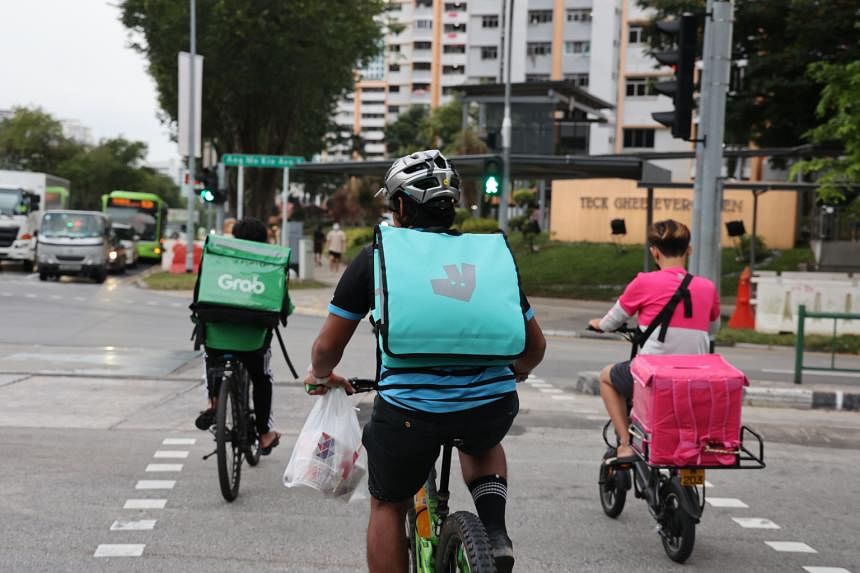SINGAPORE - The three major food delivery companies here – Grab, Deliveroo and foodpanda – have set up an industry association to represent digital platforms, ahead of possible changes to the law to give platform workers greater protection.
In a break from the typically cut-throat competition seen among e-commerce and online service platforms, the three firms on Thursday (Aug 18) said they are banding together under the Digital Platforms Industry Association (DPIA) to strengthen the industry’s practices and raise standards.
In a statement, the association said it plans to identify areas for improvement and work with the Government and other stakeholders to create solutions that “reflect the voices of its delivery partners and merchants”.
It also intends to introduce an industry code of practice that will incorporate best practices relating to the health and safety of food delivery workers.
Observers said the new association may lead to improvements in the welfare of delivery workers, which could in turn improve service quality for consumers. But these improvements are likely to be incremental and materialise only in the longer term, they added.
Singapore Management University’s Assistant Professor Terence Fan, who specialises in transport issues, said the timing of the move suggests that the intention is for this dedicated association to act as a louder, more concerted voice when responding to government policies or initiatives.
But it is unlikely to herald any drastic changes, he noted.
This development comes as the Advisory Committee on Platform Workers is expected to propose ways to improve retirement and housing adequacy, work injury compensation and bargaining power for cabbies, private-hire car drivers and freelance delivery workers later this year.
The committee was set up last September by the Manpower Ministry to study how to better protect workers who rely on digital platforms for income.
It has been discussing the issue with individual platform companies.
Its recommendations, if accepted by the Government, could lead to legislative changes – for instance amending the Central Provident Fund (CPF) Act to require platform companies to make CPF contributions, and the Work Injury Compensation Act to cover platform workers.
In response to queries, the association said its members will still engage individually with the advisory committee as each company has its own business model and interests.
In a Facebook post on Wednesday, labour MP Yeo Wan Ling, who is on the advisory committee, said the new association will add to the diversity of views and help shape the recommendations.
There are no plans for wider data sharing between members. Instead, members will collaborate to “find common ground in the spirit of improving the platform ecosystem”, said a spokesman, without elaborating.
The association plans to develop initiatives in areas such as education and awareness, rider matters and merchant development, she added.
While it will initially focus on food delivery, the association plans to expand membership to sectors such as ride-hailing or goods delivery.
The association has three office-holders and 12 executive committee members for now, split evenly between the three founding companies. Its first president is Mr Jason Parke, general manager and head of operations at Deliveroo Singapore.
Asked if the association could affect competition or create conflicts of interest among its members, its spokesman said the DPIA will comply with the rules of the Registry of Societies and the Competition Act.
Prof Fan said with adequate safeguards, such as avoiding discussions on worker remuneration, the association should not have a negative impact on competition, and instead foster more dialogue within the sector.
National University of Singapore (NUS) Business School’s Associate Professor Nitin Pangarkar said the companies appear to be showing a united front in order to put forward their side of the story. “But the Singapore Government is less susceptible to lobbying than in other countries, so I don’t know how successful that representation would be,” he added.
Prof Pangarkar said the association also represents the maturity of the food delivery industry, which had been focused mainly on growth and gaining market share.
Mr Li Jianggan, founder of tech investment firm Momentum Works, said the companies now need to aim for profitability rather than growth, meaning a shift from customer acquisition and discounts to operational effiency.
Mr Li, who was foodpanda Singapore’s managing director for five months in 2015, said collaboration between the food delivery firms is not unexpected given the issues that need to be tackled, such as those around worker welfare.
“The best approach to address some of these issues is to form industry and ecosystem-wide dialogues, and that has been the case in other more established industries,” he added.
NUS business professor Lawrence Loh said it is good that the companies are taking the initiative to work together to tackle these issues.
But he flagged that because the three firms make up almost the entire food delivery sector, consumers and workers may not have a choice should the association decide to make similar changes to their policies.
“They should strive for the highest possible protections, not the lowest common denominator,” he said.
Singapore University of Social Sciences transport economist Walter Theseira noted that industry associations are not new.
“At best, they can help to coordinate industry policies to help markets function better and promote public welfare. They can also be anti-competitive and coordinate policies that promote business interests at the expense of others,” Associate Professor Theseira said.
“In reality, they may end up doing a bit of both. It is too early to tell,” he added.
Association members represent almost entire food delivery market
Grab has more than 50 per cent share of the food delivery sector here, according to data platform Measurable AI. Foodpanda is a close second at about 37 per cent, followed by Deliveroo at about 10 per cent.
The three teamed up in March to conduct a joint survey of 4,200 food delivery riders – the first poll of its kind here.
Grab launched its food delivery service here in 2018 after acquiring the South-east Asian operations of then rival Uber.
Operating in seven other South-east Asian countries, the ride-hailing giant went public in the United States through a US$40 billion (S$55.3 billion) merger with a blank-cheque company last December.
Grab’s chief executive Anthony Tan told The Straits Times in April that its food delivery business is expected to break even by the first half of next year.
Founded in Singapore in 2012 as a web browser- and hotline-based food delivery service, foodpanda was acquired by Germany’s Delivery Hero in 2016.
At the start of last year, the company had more than 10,000 delivery workers on its platform, and it opened its new regional headquarters here last month.
London-based food Deliveroo entered the Singapore market in 2015.
As at May this year, it had more than 11,000 delivery workers on its platform.
Listed on the London Stock Exchange, the firm reported a pretax loss of £147.3 million (S$245 million) for the first half of this year, up 54 per cent from the same period a year ago.


